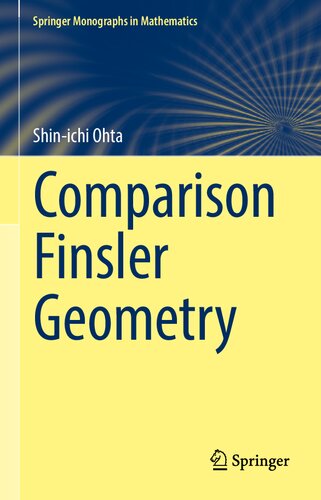

Most ebook files are in PDF format, so you can easily read them using various software such as Foxit Reader or directly on the Google Chrome browser.
Some ebook files are released by publishers in other formats such as .awz, .mobi, .epub, .fb2, etc. You may need to install specific software to read these formats on mobile/PC, such as Calibre.
Please read the tutorial at this link: https://ebookbell.com/faq
We offer FREE conversion to the popular formats you request; however, this may take some time. Therefore, right after payment, please email us, and we will try to provide the service as quickly as possible.
For some exceptional file formats or broken links (if any), please refrain from opening any disputes. Instead, email us first, and we will try to assist within a maximum of 6 hours.
EbookBell Team

4.7
106 reviewsThis monograph presents recent developments in comparison geometry and geometric analysis on Finsler manifolds. Generalizing the weighted Ricci curvature into the Finsler setting, the author systematically derives the fundamental geometric and analytic inequalities in the Finsler context. Relying only upon knowledge of differentiable manifolds, this treatment offers an accessible entry point to Finsler geometry for readers new to the area.
Divided into three parts, the book begins by establishing the fundamentals of Finsler geometry, including Jacobi fields and curvature tensors, variation formulas for arc length, and some classical comparison theorems. Part II goes on to introduce the weighted Ricci curvature, nonlinear Laplacian, and nonlinear heat flow on Finsler manifolds. These tools allow the derivation of the Bochner–Weitzenböck formula and the corresponding Bochner inequality, gradient estimates, Bakry–Ledoux’s Gaussian isoperimetric inequality, and functional inequalities in the Finsler setting. Part III comprises advanced topics: a generalization of the classical Cheeger–Gromoll splitting theorem, the curvature-dimension condition, and the needle decomposition. Throughout, geometric descriptions illuminate the intuition behind the results, while exercises provide opportunities for active engagement.
Comparison Finsler Geometry offers an ideal gateway to the study of Finsler manifolds for graduate students and researchers. Knowledge of differentiable manifold theory is assumed, along with the fundamentals of functional analysis. Familiarity with Riemannian geometry is not required, though readers with a background in the area will find their insights are readily transferrable.